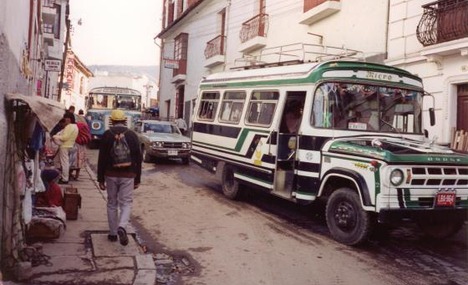Bolivia police: stranglers lured victims on buses
The little buses looked like any others as they rattled down the dirt streets of El Alto, collecting people headed to work in the pre-dawn chill.
But authorities say they were death traps, employed by a murderous band to harvest victims who would be strangled for what little they possessed.
Police are blaming the band for at least 69 killings and say dozens more victims survived the stranglings and were left for dead in isolated stretches of the working class city of 1 million people on the arid plateau above Bolivia’s capital.
“This kind of assault came about because people, of necessity, take whatever transport they can get,’’ said police Col. Felix Rocha, chief of Bolivia’s criminal police.
Gang members would ride the minibuses posing as passengers, police said. When their prey boarded and dropped into a seat, they were strangled with a rope or scarf and stripped of valuables that often amounted to little more than a cell phone and the clothes on their backs, Rocha said, the bodies dumped in remote districts of this city inhabited chiefly by indigenous migrants from the countryside.
A 64-year-old man who said he survived a Feb. 5 attack by the band recounted leaving his house at 4 a.m. on his way to the bank were he collects his monthly pension.
He said he confidently boarded what he thought was a public transit minibus because, as usual, his 25-cent fare was collected by “a cholita,’’ or indigenous woman.
“They had me sit in the front and all of the sudden I felt a blue scarf tightening around my neck. I fought back but they hit me in the ribs’’ and face and he fell unconscious, said the man, who asked to be identified only by first name, Macario, because he fears for his safety.
The gang appeared to have been less than thorough because more than 70 people told police they had survived attacks after recognizing gang members in local media reports, Rocha said. Other such bands are known to exist, but the minibus gang seems to have been the best organized and most methodical, he added.
Its alleged leader, identified by police as 33-year-old Julio Edwin Valdez, was arrested last week by heavily armed, masked police wielding assault rifles.
Also captured was Galo Mamani, identified as the bus’s driver. Prosecutors say the two face murder charges but offered few other details. The charges faced by the other suspects were not immediately clear.
“I woke up later in a dumpster,’’ Macario added. Gone were his cell phone and the equivalent of $55 in the local currency, bolivianos.
Police last week announced the arrest of eight alleged members of the band, ranging in age from 30 to 45 and including the woman, whom they identified as Yuli Gutierrez Jimenez.
Rocha said police seized four 14-seat minibuses used by the band, two of the white, one gray and another beige.
He said most of the killings occurred between 4 a.m. and 6 a.m. when public transport is relatively scarce and only 400 police are on duty in the entire city, which is mostly unpaved and where many neighborhoods lack running water and electricity.
Rocha said the band is believed to have killed 69 people whose bodies were found over the past 13 months, though prosecutor Santos Valencia said investigators are still trying to determine if the group was responsible for all those killings.
